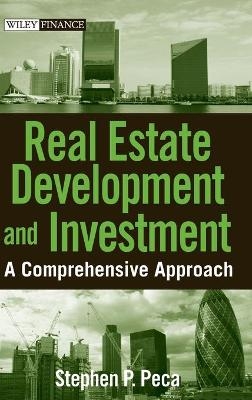
Real Estate Development and Investment
John Wiley & Sons Inc (Verlag)
978-0-470-22308-6 (ISBN)
Real Estate Development and Investment
A Comprehensive Approach
Written by real estate industry veteran Stephen Peca, this timely guide skillfully outlines the various phases of the real estate development process and addresses some of the most important issues associated with this discipline.
Using numerous illustrations and anecdotes, this book takes you through the development process, from historical considerations and idea formulation to financial feasibility and asset disposition, while covering the entire cycle of real estate development for various property types. Topics touched upon throughout these pages include:
The key factors affecting demand for different land uses and development
The interaction of market research, financing, planning, contract negotiation, marketing, leasing, and property management
The need for universal, current, and broad knowledge
The importance of ethics in the development process
The role of different professionals and companies involved in the development process
Environmental considerations in real estate development
And much more
Filled with in-depth insights and practical advice, this reliable resource will help you gain a firm understanding of the functional skills necessary to be successful in this field and familiarize you with several often-overlooked-but essential aspects of commercial real estate development.
Stephen P. Peca, CPA, MRICS, is a Managing Director of Concourse Realty Group, LLC, and is an adjunct assistant professor in the Real Estate Institute of New York University. Before forming Concourse Realty Group, he was with Fleet Securities, Inc. Peca also has extensive experience as a commercial banker, chief financial officer, and property developer. Much of his work extends into overseas markets, and as such, Peca has extensive experience arranging international and cross-border transactions, including corporate, project, and infrastructure finance. Peca has a Certificate in Advanced Management from the University of Chicago and has a BBA in public accounting. He has received the New York University Award for Outstanding Service and is a Member of the Royal Institution of Chartered Surveyors as a Chartered Management Consultancy Surveyor. He is also a member of the Financial Executive Networking Group (FENG) and established and leads the FENG NYC Real Estate Special Interest Group and is a member of CoreNet Global.
Preface. Acknowledgments.
Chapter 1 Overview of the Development Process.
Economic Perspective.
Relevancy of Universal Knowledge.
Ground-Up Development versus Redevelopment.
The Six Phases of Development.
Chapter 2 Business Ethics.
Relevancy to the Real Estate Industry.
Legislated Ethics.
Chapter 3 Project and Development Teams.
Types of Developers.
Functional Disciplines in the Development Process.
Factors to Consider When Forming a Development Team.
Chapter 4 Historical Perspective Of Real Estate Development.
The Beginnings of Real Estate Development.
Major Events Causing Change in the United States.
Chapter 5 Market Research.
Inception of the Idea.
Markets, Market Research, and Marketing (Analysis of Development Potential).
Concepts That Define Marketing (and Markets).
Using Market Studies and Preparing for Marketability Studies.
Sources of and Methods for Gathering Information.
Flaws of a Study.
Validate the Data and the Importance of Revisions and Updates.
Chapter 6 Marketability Studies.
Showing That Your Development Concept Could and Should Be Built.
Importance of Marketability Studies Revisited.
Idea Refinement and the Application of the Marketability Study.
The Process of Idea Refinement.
Chapter 7 Land Acquisition and Control.
Nonspatial and Spatial Markets.
Elements of Design.
Target Markets and Market Share.
Site Control and Acquisition.
Public and Private Restrictions on Land Use.
Chapter 8 Land Planning and Siting.
Value Creation.
Project Programming and Design.
Elements of Design—Again.
Talking to End Users.
Tenant Mix and Marketability.
A Brief Word about Architectural Drawings.
Chapter 9 Entitlement Process and Public-Private Partnerships.
Typical Community Approval Process.
Public-Private Partnerships.
Chapter 10 Budgeting, Financial Analysis, and Capital Structure.
Preparing for the Financial Analysis and Pro Forma.
The Development Budget.
The Operating Pro Forma.
Review of Common Analytical Measurements.
Financing and the Capital Markets.
Short- and Long-Term Financing.
Financing Cycle—Anticipating Requirements.
Elements of a Feasibility Study or Deal Book.
Guarantees.
Chapter 11 Contractors, Consultants, and Construction Contracts.
Budgeting and Scheduling.
Contractors and Construction Contracts.
Risk Management during Construction.
Preparing for Construction: Bid Proposals and Review.
Construction Documents and Construction Agreements.
Risk Management: Part 2.
Scheduling.
Bonding and Insurance.
Construction Monitoring: Draw Meetings; Managing Change Orders.
Tenant Improvements and Coordination.
Construction Closeout.
Chapter 12 Leases and How They Are Used.
Value Creation.
What Is a Lease?
Common Lease Structures.
Lease Management and Analysis.
Chapter 13 Marketing Focus of Development.
Know Your Target Audience.
Your Essential Vision.
The Importance of Branding.
Image, Identity, and Communication.
Components of Marketing Centers.
Chapter 14 Investment Management.
Function and Goal of Property Management.
Function and Goal of Asset Management.
Function and Goal of Portfolio Management.
Property Life Cycle.
Chapter 15 The Future.
Recent History—Where We Left Off.
Apparent Future Trends.
Green Development and Smart Growth.
Social Responsibility and Ethics.
Glossary.
Index.
| Erscheint lt. Verlag | 5.6.2009 |
|---|---|
| Reihe/Serie | Wiley Finance |
| Zusatzinfo | Tables: 1 B&W, 0 Color |
| Verlagsort | New York |
| Sprache | englisch |
| Maße | 164 x 233 mm |
| Gewicht | 406 g |
| Themenwelt | Wirtschaft ► Betriebswirtschaft / Management ► Rechnungswesen / Bilanzen |
| Betriebswirtschaft / Management ► Spezielle Betriebswirtschaftslehre ► Immobilienwirtschaft | |
| ISBN-10 | 0-470-22308-1 / 0470223081 |
| ISBN-13 | 978-0-470-22308-6 / 9780470223086 |
| Zustand | Neuware |
| Haben Sie eine Frage zum Produkt? |
aus dem Bereich


